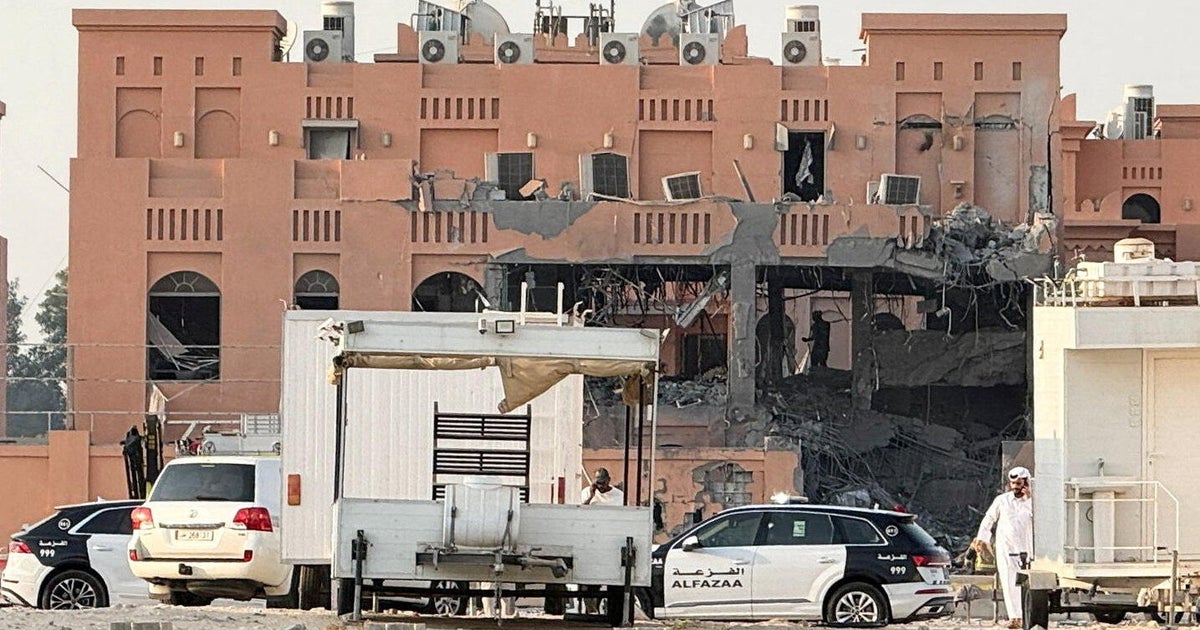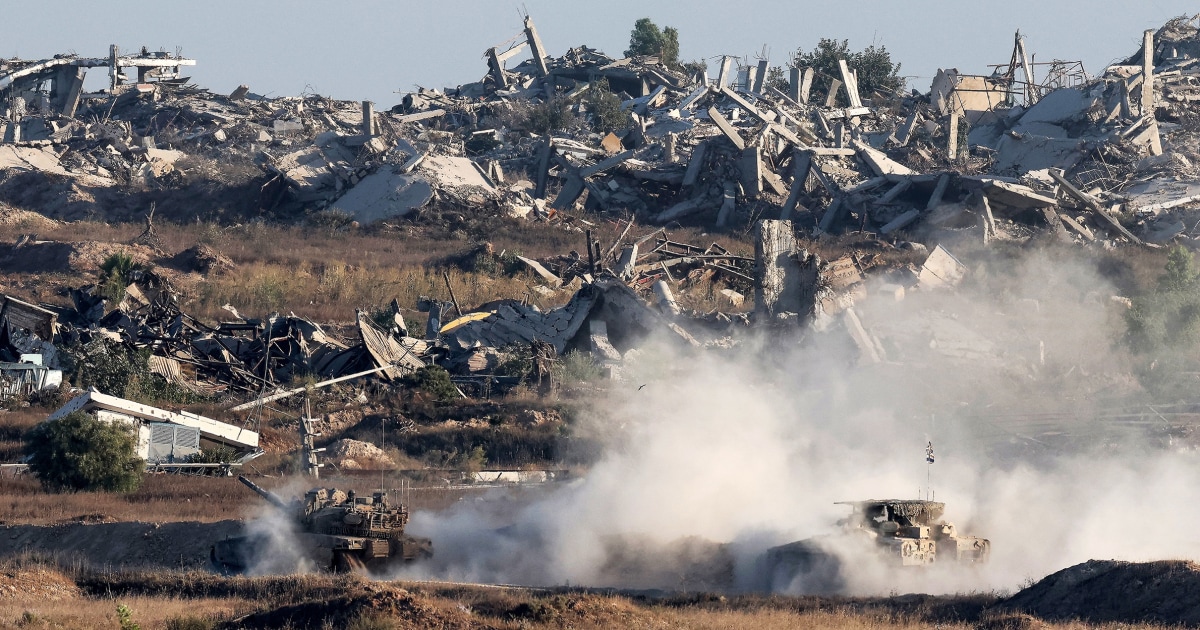Israel's Targeting of Enemies in Qatar Sparks International Concern

Introduction
After a recent attack on Hamas in Qatar, Israel has declared that it will target its enemies "everywhere." This statement has raised concerns and sparked international reactions, with the UAE president visiting Doha in solidarity and President Trump giving a rare censure to an attack on an American ally.
Key Details
The attack on Hamas in Qatar was a response to the ongoing conflict between Israel and Palestine. However, this incident is significant as it is the first time Israel has explicitly stated its intention to target its enemies beyond its borders. This decision has also sparked concerns about potential escalation of the conflict and the impact it may have on other countries in the region.
The visit of the UAE president to Doha is seen as a gesture of support for Qatar, a country that has been facing a blockade from its neighboring countries, including the UAE. This visit also highlights the complex political dynamics in the Middle East and the shifting alliances in the region.
Impact
The statement from Israel and the international reactions have raised questions about the stability and security of the region. The potential consequences of this incident and the actions that may follow are uncertain. It also raises concerns about the role of other countries, such as the US, in the conflict and their stance on the situation.
About the People Mentioned
President Trump
Donald John Trump, born June 14, 1946, in Queens, New York, is an American businessman, media personality, and politician who has served as the 45th and 47th president of the United States. He graduated from the University of Pennsylvania's Wharton School with a degree in economics in 1968 and took over his family’s real estate business in 1971, renaming it the Trump Organization. Over decades, he expanded the company’s holdings into skyscrapers, hotels, casinos, and golf courses, building a high-profile brand often associated with luxury and real estate development. Trump also gained fame as the host of the reality TV show *The Apprentice* from 2004 to 2015[1][3][7]. Trump entered politics as a Republican and won the presidency in 2016, defeating Democrat Hillary Clinton in an unexpected victory. His tenure from 2017 to 2021 was marked by significant policy shifts, including tightening immigration controls, imposing a travel ban on several Muslim-majority countries, expanding the U.S.–Mexico border wall, rolling back environmental regulations, implementing major tax cuts, and appointing three Supreme Court justices. His foreign policy included withdrawing the U.S. from international agreements on climate change and Iran’s nuclear program, and initiating a trade war with China. Trump's handling of the COVID-19 pandemic was widely criticized for downplaying the virus's severity. After losing the 2020 election to Joe Biden, he challenged the results, culminating in the January 6, 2021, Capitol attack. Trump was impeached twice but acquitted both times by the Senate[1][2]. In a historic political comeback, Trump was re-elected and inaugurated for a second non-consecutive term on January 20, 2025, becoming the oldest president to assume office at age 78. He remains a highly influential and polarizing figure in American politics[2][7]. Trump is married to Melania Trump, with whom he has one son, Barron, and has four adult children from previous marriages. He has authored several books, including *The Art of the Deal*, a business bestseller[3][5][7].
About the Organizations Mentioned
Hamas
**Hamas** is a Sunni Islamist Palestinian nationalist organization that functions both as a political party and a militant group, primarily operating in the Gaza Strip, which it has governed since 2007. Founded in 1987 by Ahmed Yassin amid the First Intifada, Hamas emerged from the Muslim Brotherhood and initially had covert Israeli support as a counterweight to the secular Palestinian Liberation Organization (PLO)[3][1]. It combines political governance with an armed wing, the al-Qassam Brigades, committed to armed resistance against Israel, which it refuses to recognize as a legitimate state[1][3]. Hamas’s political rise culminated in a 2006 electoral victory in the Palestinian Legislative Council, campaigning on anti-corruption and resistance platforms. After violently seizing Gaza from the rival Fatah faction in 2007, Hamas has maintained de facto control there despite international isolation and blockades imposed by Israel and Egypt[3]. Its governance has been marked by repeated conflicts with Israel, including major wars in 2008–09, 2012, 2014, 2021, and the ongoing intense conflict triggered by Hamas’s surprise October 2023 attack killing nearly 1,200 Israelis and taking hostages[1][2][3]. Hamas benefits from regional support, especially from Iran, which supplies funding and weapons, as well as financial and political backing from Turkey and Qatar. These alliances form part of a broader "axis of resistance" against Israel, which includes groups like Hezbollah and Palestinian Islamic Jihad[2]. Hamas also operates fundraising networks globally, sometimes using charities as fronts to support its military activities[4]. The group is designated a terrorist organization by many countries, including the United States, which has increased military aid to Israel following recent escalations[2][6]. Despite modifying its 1988 charter in 2017 to soften some language, Hamas continues to reject Israel’s legitimacy and pursues all forms of resistance[1]. Its enduring political
Qatar
Qatar is not an organization but a country located in the Middle East, known for its significant contributions to global business, technology, and social development. Here is a comprehensive summary of Qatar's key aspects: ## Overview Qatar, officially the State of Qatar, is a constitutional emirate with a hereditary monarchy. It is ruled by the Āl Thānī family, with the current emir being Sheikh Tamim bin Hamad Al Thani. The country's government structure includes a Council of Ministers and an advisory Shura Council, although the latter's electoral component was abolished in 2024[4]. ## History Qatar's history is marked by its transformation from a small tribal state to a major economic power. After World War II, oil revenues significantly increased, leading to rapid modernization and political stability within the ruling family[4]. In 2003, a new constitution was approved, which initially provided for the election of the Shura Council, but these elections were repeatedly delayed until 2021 and later abolished[4]. ## Key Achievements - **Economic Diversification**: Qatar has successfully diversified its economy beyond oil and gas, with non-oil sectors contributing over 60% of GDP in 2024[8]. Tourism, logistics, and financial services are key drivers of this diversification. - **Global Events**: Qatar hosted the FIFA 2022 World Cup, which was a significant achievement in terms of infrastructure development and international visibility[8]. - **Investment and Development**: The government has allocated substantial funds for major projects, including education and healthcare, with a budget of $5.3 billion for education and $6 billion for health in 2025[2]. ## Current Status Qatar continues to invest in strategic sectors like education, healthcare, and environmental sustainability. The country is hosting the Second World Summit for Social Development in 2025, focusing on inclusive social development[6]. Its GDP per capita is among the highest
UAE
## Overview The **United Arab Emirates (UAE)** is a federal sovereign state in the Arabian Peninsula, comprising seven emirates—Abu Dhabi, Dubai, Sharjah, Ajman, Umm Al Quwain, Ras Al Khaimah, and Fujairah. Established in 1971, the UAE has rapidly transformed from a collection of desert sheikhdoms into a global economic, technological, and cultural hub. ## Governance and Political Structure The UAE operates a unique federal system, balancing centralized authority with local emirate autonomy. The Supreme Council of Rulers—composed of the seven emirate rulers—elects the President and Vice President, both serving five-year renewable terms[1]. The President appoints a Prime Minister, who leads the Council of Ministers (Cabinet) responsible for federal policy[1]. Legislative advice is provided by the Federal National Council (FNC), a 40-member parliament that reviews laws and questions ministers, with half its seats now held by women following recent electoral reforms[1]. While political parties are banned and executive power remains centralized, the UAE has incrementally expanded citizen participation in governance[8]. ## Economic and Technological Achievements The UAE’s economic model is renowned for diversification, moving beyond oil to sectors like finance, tourism, logistics, and technology. Real GDP grew 4% in 2024, with projections of 4.4% in 2025 and 5.4% in 2026[5]. The country is a top global destination for foreign investment, hosting over 1,500 American companies and serving as a gateway to the Middle East, Africa, and Asia[5]. In 2025, the UAE ranked 9th globally in the Chandler Good Government Index, reflecting strong institutions, financial stewardship, and a focus on innovation[2]. Key initiatives include the Science, Technology, and Innovation Policy (2024), Projects of the 50 (aimed at economic















